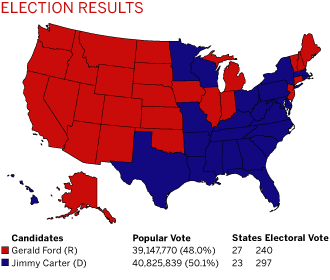On August 9, 1974, after a Senate investigation revealed his direct involvement in the cover-up of the Watergate break-in, Richard Nixon became the first president in American history to resign from office. Nixon was succeeded by Gerald Ford, who had been appointed vice president after a bribery scandal forced Spiro Agnew’s resignation in October 1973. These scandals and the televised Watergate hearings, which resulted in the conviction and imprisonment of 25 Nixon administration officials, shattered the public's trust in the government. In a 1974 poll, 43 percent of respondents said that they had "hardly any" faith in the executive branch. As a result, the 1976 election was dominated by issues of integrity and character. Hoping to put the Watergate affair to rest, President Ford unconditionally pardoned Nixon in September 1974, but the move hurt Ford’s political standing. Ford won the Republican nomination only after fighting off a strong challenge from Ronald Reagan.
The Democrats nominated Georgia Governor Jimmy Carter, a former naval officer and peanut farmer. Carter, who promised, "I will never tell a lie to the American people," ran a brilliant campaign as an outsider, offering a fresh change from Washington politics as usual.
Democrat
Jimmy Carter for president
Walter Mondale for vice president
"Leadership for a Change"
Jimmy Carter was campaigning to become the first president from the Deep South since 1849. His ads, created by Atlanta advertising executive Gerald Rafshoon, skillfully made use of his heritage. They portrayed him as honest, hardworking, untainted by Washington politics, and almost mythically connected to America’s agricultural past--a non-lawyer who knew the value of manual labor. His campaign is best summarized by the five-minute biographical spot that shows him in work clothes walking through a peanut field, and includes interviews with his colorful family.
Yet establishing a farming background was not enough to qualify a candidate for the presidency. As the campaign progressed, Carter was made to look more and more presidential. Having emphasized his southern roots in his early ads, Carter appeared in a series of spots, produced late in the campaign, in a formal indoor setting wearing a suit and tie.
Republican
Gerald Ford for president
Robert Dole for vice president
"He’s Making Us Proud Again"
As a candidate, President Ford was in the unenviable position of being the incumbent at a time when Americans had lost their faith in the presidency. Not surprisingly, Ford’s ads pictured him as a different kind of leader from Richard Nixon. They consistently portrayed him as a regular guy and a nonimperial president. Spots filmed inside the White House showed him dressed casually, with an open collar and no tie. They also claimed that Ford was responsible for turning the country around and leading it out of the Watergate nightmare.
With the Vietnam war over, inflation beginning to ease, and the country in its bicentennial year, the Ford campaign produced a series of ads showing a montage of happy Americans accompanied by an upbeat song featuring the lyrics, "I’m feeling good about America, I’m feeling good about me."
Largely because of his pardon of Nixon, Ford found himself trailing in the polls through much of the campaign. As a result, the Republicans ran ads that capitalized on voters' doubts about the relatively unknown Jimmy Carter. In one series of man-in-the-street ads filmed in Atlanta, the Georgia voters who were presumably most familiar with Carter criticized his record as governor. Carter would use the same technique during his 1980 campaign against former California Governor Ronald Reagan.
